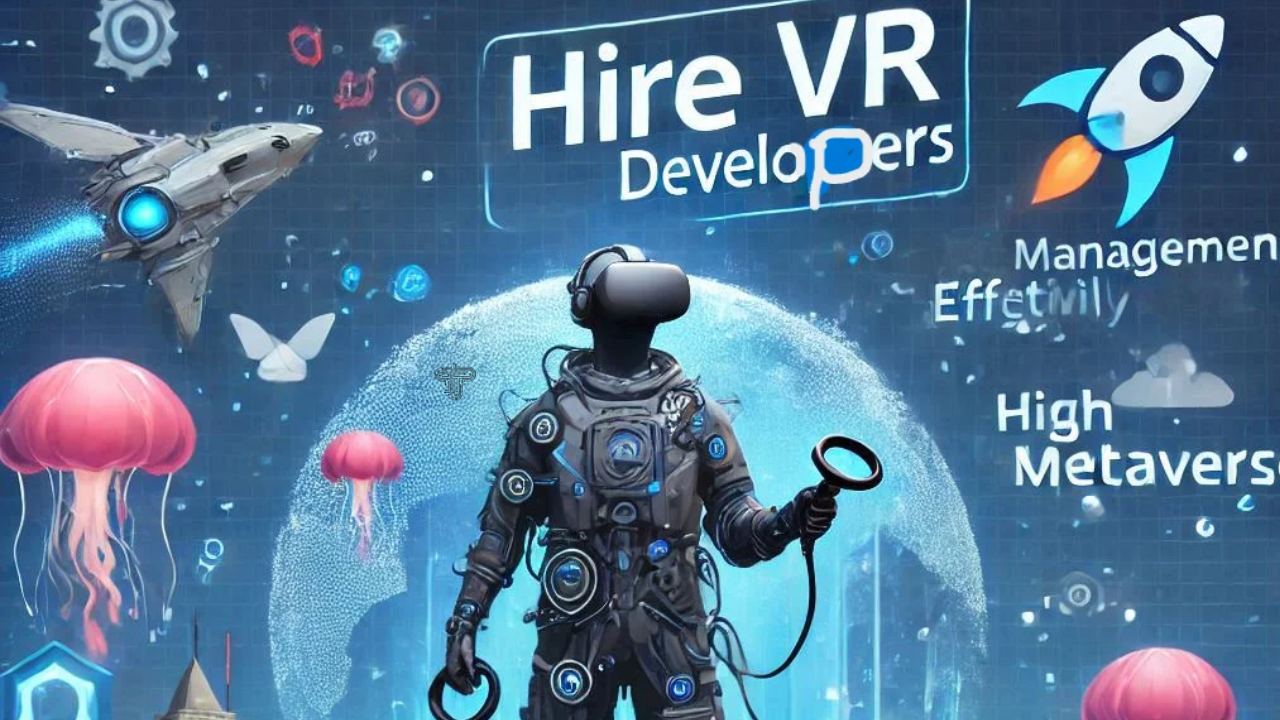Hire VR Developers Effectively With Proper Management to Create a High Metaverse.
The metaverse is one of the most transformative technological trends of the 21st century: it is a shared digital universe combining virtual reality (VR), augmented reality (AR), and other immersive technologies. Businesses and innovators are racing to establish their presence within the metaverse, creating virtual spaces that redefine social interaction, commerce, entertainment, and education. However, one critical factor that makes a metaverse project a success is the expertise of the VR developers behind it.
It is hard to find the right VR developers to work with, and finding and hiring them requires careful thinking, a deep understanding of the requirements of your project, and knowledge of the dynamic landscape of virtual reality development. This guide will walk through the process of hiring capable VR professionals and partnering with leading companies to develop your concept for the metaverse.
Understanding the Role of VR Developers in the Metaverse
The VR developers are essentially the architects of an immersive experience, designing virtual environments, interactive elements, and realistic simulations that define the metaverse.
Their tasks involve designing and coding 3D worlds, implementing VR mechanics, and ensuring smooth user interaction in the virtual world. Depending on the scale of your metaverse project, a VR developer can specialise in game engines such as Unity or Unreal Engine, focus on performance optimization on various VR hardware platforms, or even build cutting-edge applications with state-of-the-art VR frameworks.
Because metaverse development encompasses various disciplines, VR developers often collaborate with 3D artists, UX/UI designers, network engineers, and blockchain specialists. The developer must possess problem-solving skills, be creative, and have technical capabilities to deliver a cohesive and engaging virtual world.
When selecting VR developers, it is essential to identify candidates with experience with the specific technologies and tools relevant to your project, from immersive gaming to virtual real estate or virtual commerce platforms.
Assessing your Metaverse project’s needs
Define the goals and scope of your metaverse project beforehand and outline the technical requirements when hiring. Are you creating a social hub where all users interact and collaborate? A virtual marketplace trading digital assets? A gamified environment with interactive quests and challenges? Each kind of application requires a slightly different set of skills and expertise. Knowing your goals will help you decide if you need generalist developers who can handle most aspects of the project or specialists in one or more areas, like physics simulations, multiplayer systems, or VR optimization for wearable devices.
In-house development is very vulnerable to budget and timelines. Projects requiring deep control over the developmental process must hire in-house developers. Still, some projects can be employed by offering to the top metaverse development companies that can provide end-to-end solutions. Once all the above factors are cleared, the needs would be effectively expressed before those potential candidates and service providers.
Skills and Qualities to Look for in VR Developers
The metaverse will require combined technical competence and creative vision. Therefore, technical skills and creative visions are in high demand when searching for VR games developers. Technical capabilities to look for might include experience working on development platforms such as Unity, Unreal Engine, or WebXR; programming languages such as C#, C++, or JavaScript; and tools like Blender or Maya for 3D modelling. These experts can further add another dimension to your project by providing intelligent virtual agents or adaptive environments if they know about AI and machine learning.
Similar in importance, soft skills have a place when hiring VR developers. They need to work well in multidisciplinary teams, be responsive, and be adaptive to the ever-changing nature of metaverse projects. A developer who enjoys immersive technologies and is motivated to stay informed about current trends in that field should also be an important consideration; the metaverse is such a dynamic field.
FOR MORE INFORMATION CLICK HERE : gifts for kids
Where to Find the Best VR Talent
The challenge of sourcing developers is that they cannot be found easily in the market, as there is a competitive demand for talent from other parties.
For large and complex metaverse projects, one may partner strategically with the existing development companies in metaverse construction. Such companies have an expert team of virtual reality developers and designers who work based on an engineering background and will be able to meet all the comprehensive needs based on your requirements. Several of the best development companies in this field have great experience producing immersive experiences for big brands and start-ups.
Search and read thoroughly about good client reviews to get you the best partners for your project.
Evaluating Candidates and Partners
Once you find a possible developer or metaverse development company, the next thing would be to assess their qualification, experience, and compatibility with your project. First, start with a review of their portfolios in terms of quality and diversity in the work that they have previously done. You would then find some examples of similar projects like yours, which signifies that they can meet specific requirements.
Technical interviews and coding tests will be very helpful in assessing a developer’s skills and ability to solve problems. Request detailed proposals from company partners outlining their approach, timelines, milestones, and deliverables for your project. Transparency and open communication will be key indicators of a reliable partner, so look for candidates or companies that clearly understand your goals and are willing to collaborate closely throughout the development process.
The benefits of collaboration with top metaverse development companies are numerous.
Individual developers could be hired for smaller projects or well-established in-house development teams. Still, large and more ambitious efforts would benefit more by partnering with the top metaverse development companies. This would mean that the expertise in building metaverse platforms, using the most recent cutting-edge technologies, and the comprehensive interdisciplinary team with the ability to tackle anything from conceptual design through deployment and maintenance would be more meaningful.
You can outsource your project to a trusted development company so that they can use their experience in handling technical issues, performance optimization, and the final polish of the product. The most reliable metaverse development companies maintain ties with the producers of VR hardware and software developers; hence, their integrations will be smoother and work correctly on other platforms.
Navigating the Hiring Process This will, however, depend on various steps taken in the hiring process of Virtual reality developers or even hiring a metaverse development company, from outreach to finalizing contracts. In this document, write a detailed job description or project brief with your expectations, technical requirements, and desired outcomes. It would serve as a reference for the candidates and partners, so they understand the scope of work and correspondingly align their capabilities.
Focus on their approach toward problem-solving, collaboration, and innovation when interviewing or meeting with candidates or companies. Ask for similar projects they have handled, which tools and workflows they like, and how they keep abreast of the latest developments in VR and metaverse space. This will allow for proper communication and realistic expectations for a smooth partnership.
Tech Blaster
Overcoming Barriers to VR Recruitment
Some of the new challenges involve recruiting talent to work on metaverse projects. To put it mildly, the speciality involved in VR development demands good talent, and whenever the high demand reaches a level, it necessitates recruiting scarce market resources. Thus, attract the best with a promise of matching competitive compensation packages, flexible work arrangements, and adequate professional space. Make it a special project, as exciting an opportunity as your company has ever had with such immersion technologies.
Cultural fit is another crucial element, especially when developing an in-house team. Because of the fast pace and the collaborative nature of metaverse projects, your team must be cohesive; prioritize those who share your vision and values. Establish clear communication channels and project management practices for remote or freelance developers to keep everyone aligned and productive.
Future Trends and Opportunities in the Metaverse This metaverse is evolving fast. Here, new technologies and new applications emerge quickly. So, your team will need to be constantly updated about the trends shaping the metaverse’s future, from the latest progress in haptic feedback and spatial audio to improvements in cloud rendering, especially blockchain and NFT integrations, for secure digital ownership and monetization.
This will be more beneficial because your projects will stay ahead of trends, attracting users and changing the face of immersive experiences. There is always encouragement for VR developers to try out and experiment with cutting-edge tools coupled with the help of industry experts towards pushing the limits of possibilities in the metaverse.
Hiring the right developers would be critical in building a successful metaverse project. Regardless of choosing in-house team building or partnering with the best metaverse development companies, success more or less depends on identifying your distinct needs in your project, selecting skilled professionals who fit the technical and creative requirements, and maintaining an atmosphere that fosters collaboration and innovation. You are building an assembly of people who will make your metaverse vision a reality, capturing users and having a long-term impact by applying a strategic approach to hiring.







